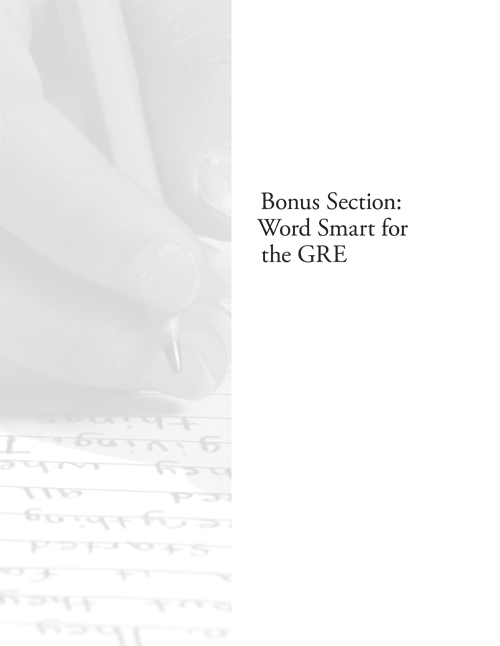

Word Smart is a series designed to help you learn the words that are the most important components of an educated vocabulary and which will help you do well on the Verbal sections of tests like the SAT and GRE. This section is an excerpt from Word Smart for the GRE and contains a sampling of words specifically tested on the GRE, along with effective strategies for learning them.
For the most part, the GRE Revised General Test doesn’t measure what you know. Instead, it tests how you work through certain kinds of problems. The most important exception to this is vocabulary, one of the few “content areas” tested on the exam. Educational Testing Service (ETS) figures that even if you haven’t studied math since your first year in college, you should still have been building your vocabulary continuously since high school. Thus, the range of words ETS expects you to know on the GRE is that much wider.
There is some good news, though. Memorizing the dictionary is not the best way to improve your knowledge of the vocabulary that will be tested on the GRE. There is a particular range of words tested, and plenty of words in the dictionary will never show up on this test. The words that the GRE tests range from words you know well (fruit, angry, write), to words you recognize and may use on occasion (cohesion, discrete, replicate), to words you may never have encountered before (homiletics, stentorian, palliate). Because the GRE does not test your knowledge of specific subjects, you don’t need to know the technical language, or jargon, particular to any discipline. Nor does the test include truly esoteric words that are very technical, or specific to a discipline, or just plain weird (words like sesquipedalian).
Not only does ETS stick to a range of vocabulary, but it also seems to go through phases in which certain words pass in and out of vogue. Some words show up frequently on the test, and then seem to fall out of favor, only to return to their former glory at some later point. The vocabulary in this section includes a sampling of the GRE Hit Parade, the words most frequently tested on the GRE. We keep the Hit Parade updated to reflect the words that currently appear with the greatest frequency. By memorizing these words, you are learning the highest yield material on the Verbal section of the test—the words that will get you a higher score.
Of course, there’s no guarantee that any individual word will show up on the test you take, but the ones in this section are some of those most likely to appear. As you start to recognize words as “GRE words” and augment your list accordingly, you’ll also improve your ability to communicate your ideas precisely in your daily life. Pretty cool, huh?